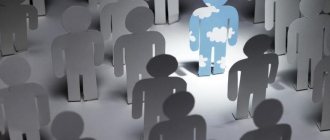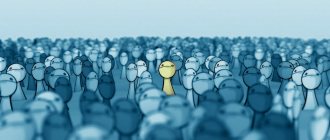An individual is a separate individual that combines a unique set of innate qualities and acquired properties. From the perspective of sociology, an individual is a characteristic of a person as a separate representative of the biological species of people. An individual is a single individual of representatives of Homo sapiens. That is, it is an individual human being that combines the social and the biological and is determined by a unique set of genetically programmed qualities and an individual socially acquired set of traits, characteristics, and properties.
Individual, personality, individuality - differences
The concepts of personality, individuality and individual cannot be identified; they are different. It is important to know what a word means so that you can use it in the correct context. The division according to Ananyev B.G. is in the table below.
| Concept. | Brief definition. |
| Individual. | An individual organism, a representative of the human race, humanity. Considered primarily from a biological point of view. |
| Personality. | A reflection of human social nature, a complex of developed habits, preferences, experience and knowledge. |
| Subject of activity. | Manager of active activities. A person developing in his profession, his own business. Who uses his efforts purposefully. |
| Individuality. (individual + personality + subject of activity) | A bearer of qualities, a set of properties and characteristics of a person that make him unique and inimitable among other people. |
Were you aware of the differences in the meaning of the terms? Share your thoughts in the comments.
Interrelation of concepts
All of the above related mainly to the differences between the concepts under consideration. At the same time, there is a relationship between all of them, which also cannot be ignored. The concepts of “individual”, “individuality” and “personality” can be considered as stages of a person’s personal evolution. Every person becomes an individual immediately after birth. As he grows up, he acquires individuality , which consists of genetically determined and acquired properties.
Personality and individuality are formed in parallel, largely under the influence of the same factors. As an individual develops psychologically, he acquires unique traits that help him interact better with society and the environment. At the same time, all three concepts are applicable to it, which characterize it from different sides. Each person is an individual, personality and individuality. And what to call it depends on the goals and objectives set.
Social individual
A person does not immediately become a social individual. He is born a defenseless and helpless creature. The sociality of the individual is achieved at the expense of society. First, these are his parents and immediate relatives. Then this field expands (kindergarten, school, media, friends, teachers, neighbors).
The child acquires social skills of the society in which he develops. That is why different peoples differ in their views on life, traditions, and cultural trends. This separates a particular people from other nationalities.
How does socialization of an individual occur?
In order to socialize, it is important for a child to go through a number of steps:
- Socialization in the family. Parents, relatives or people replacing them tell the child how to behave correctly, what qualities he needs to have, and how to act in a given situation. Often, the socialization of an individual at the family level occurs in the form of imitation of others. An individual copies the behavior of adults and can absorb both positive qualities and those that are not.
- Socialization in children's educational institutions. Educational institutions include kindergartens, schools, clubs and additional education sections. These social institutions help a person learn to communicate and interact with other people. They give him new knowledge, introduce the individual to who success and failure are. It's a tougher environment. She is not as supportive of the individual as his parents and relatives.
- Socialization among peers. It is interaction with peers that makes a child more socialized. By communicating with them, the individual learns about those areas that he cannot discuss with his parents. This allows a person to develop, modify and adjust his own worldview.
What else do you think influences the socialization of an individual? Share your opinion in the comments.
The video talks about the socialization of an individual from the point of view of social science.
Archetypes of the collective unconscious according to Jung
By archetypes, Jung means universal mental structures that are in a person from birth; they are part of the collective unconscious.
There may be countless archetypes, but Jung identifies only a few of the most significant: mask, shadow, anime and animus, self:
- A mask is a mask, a public face that a person puts on when going out into society and interacting with other people. The function of a mask is to hide one's true face, in some cases to achieve certain goals. The danger of wearing a mask often lies in the alienation from true emotional experience and characterizes a person as stupid and narrow-minded.
- The shadow is the complete opposite of the previous archetype. It includes everything secret, dark hidden, animal component that cannot be pulled out due to the subsequent negative reaction from the public. However, the shadow also has a positive component - it contains a person’s creativity, an element of spontaneity and passion.
- Anime and animus refer to the androgynous predisposition in all people. In other words, it speaks of the presence of the feminine principle (anima) in a man, and the masculine principle (animus) in a woman. Jung came to this conclusion based on observations of the production of hormones of the opposite sex in men and women.
- The Self is the most important archetype around which the others revolve. When the integration of all parts of the human soul occurs, the individual feels completeness and harmony with himself.
Individual behavior
A person as an individual can behave in different ways. There are features that reflect the behavior of a particular individual.
The type of behavior can be conscious or unconscious, regulated, change depending on circumstances or remain static. Behavior can be normal and deviant, that is, deviating from the norm.
Behavior can change due to acquiring new knowledge and skills.
Behavior cannot be spontaneous; it always has reasons and goals. An individual cannot always realize, understand and defend them.
Motivation is formed from behavior - the desire to satisfy one's needs. A goal arises in place of an unsatisfied or unrealized need. This forces the individual to act and understand why this is happening.
With the advent of computer technology, we started talking about virtual human behavior. It is often characterized by artificiality, pretense, and unreality.
How to work out
Of course, everyone wants to stand out from the rest. The main thing is that this does not run counter to generally accepted rules of behavior in society and is not accompanied by infringement of the rights of others. A bright personality, if it is positive, allows a person to achieve a lot:
- he will be given preference at a job interview;
- his loved one will single him out from all other applicants;
- he attracts sincere attention;
- often becomes a leader;
- has many friends and acquaintances.
These are not all the benefits of standing out from the crowd. Therefore, at any age, it makes sense to think about how to emphasize individuality, develop, develop, and direct it in a positive direction. Psychologists have a large number of ways and techniques to do this.
In children
The formation of individuality should ideally occur in childhood. Therefore, every parent who cares about the full development of their child should contribute to the formation of qualities in him that will distinguish him favorably from others. This issue should be approached comprehensively.
Develop a taste
To do this, children need to be taught beauty from an early age. Listen to classical music, go to museums, theaters and art galleries. Observe the beauty of nature. Surround yourself with elegant things. Teach neatness and self-care rules. Talk about color combinations. Choose clothes together. As you age, follow the fashion and individual styles of various stars. This will help you create your own unique image in the future and attract attention in any society with an impeccable appearance with a twist.
Learn to communicate
First of all, teach the rules of behavior in society. Provide him with the opportunity to communicate with peers. Invite his friends home, watch their interactions, carefully correct your own child’s mistakes. Make sure that he does not have obsessive movements or uncontrolled facial expressions. Develop leadership qualities, if any.
Form your own point of view
At the same time, develop your own vision of everything that happens around you. The most basic technique: after reading a fairy tale or watching a cartoon, ask which characters, from the child’s point of view, are good and which are bad, and why. As you grow older, you need to show that the general opinion may not always be correct. Everyone feels sorry for the cheerful and mischievous Kolobok, who was eaten by the Fox. But is he really a positive character if he disobeyed his grandparents and ran away from them?
Enrich your inner world
To promote the development of creativity: send it to an art studio, dance, or sports, where the child can realize himself. Broaden your horizons by reading books, listening to classical music, visiting museums.
The development of adequate self-esteem also has a great influence on the formation of a child’s personal characteristics. If any problems are noticed with it, it is better to seek help from a professional. Talk to your children every day and ask them to review what happened that day.
In adults
The main thing is to understand that purple hair and a nose piercing are far from an expression of individuality. In order to develop it, it is recommended:
- spare no money and time and sign up for thematic psychological training;
- constantly work on yourself: develop willpower through time management, level up self-esteem with the help of affirmations;
- study the stylistic uniqueness of various world-famous stars, take an interest in fashion, work with a stylist and makeup artist to find and create your own unique image;
- train the ability to discuss;
- do something truly useful (not in words, but in deeds) for your city;
- develop creatively: draw, weave, sculpt, build, write to reflect your own view of the world;
- develop your intellectual abilities and memory, expand your horizons.
As the famous German romantic writer Hoffmann said, most people are like coins, on which the same images are minted, but there are those who are like medals, struck only for a special occasion. The latter are individuals. And what to be in this life - a stamped coin or a ceremonial medal - everyone decides for himself.
Individual and group
Individuals form groups. The group includes several individuals, each of whom has individual characteristics. A group of individuals is united by a goal that shapes their common activity.
A person joins a group and becomes part of it, but at the same time does not lose his individual traits. While he is in the group, he speaks on behalf of the group, and not on his own. His statements are dictated by the regulations adopted in a particular team. Each individual in the group occupies a certain position.
A person can leave the group at any time or contribute to its further development.
Usually an individual enters a group with the goal of solving his problem, doing research on something, or improving his professional activities.
Features of dividing individuals into groups in sociology.
| Sign of division. | Description. | Example. |
| Age. | Throughout their lives, individuals are divided into groups based on age, since much in a person’s life depends on this. | A kindergarten group, a school class, a group of technical school students. |
| Floor. | A person’s social role and lifestyle depend on his gender. | A group of young mothers, a men's soccer team, a women's choir. |
| Territory of residence. | People unite into groups according to the territory of their own residence. | Residents of Pokhvistnevo, living in house No. 13 on Lenin Street in Moscow, residents of the city complex Nightingale Grove. |
| Profession. | Members of a social group can unite by type of activity or direction of their career. | Education workers, mathematics teachers, employees of school No. 8 in Saratov. |
| Religious affiliation. | There are about 5,000 different religious movements in the world, and each of them has supporters. | Christians, Muslims, Protestants, Catholics. |
| Nationality. | Today the idea of cosmopolitanism (every person is a citizen of the world) is growing and developing. But some people still consider themselves to be a certain nation. | Armenians, Koreans, French, Italians. |
What social groups do you know? Give examples in the comments; we and our readers will be interested to read them.
An example of an individual's behavior in a group is in the video below. A very interesting experiment that will tell you how quickly a person sometimes adapts even to stupid rules.
Human
Man is a representative of the species Homo Sapiens, the result of a biological revolution. As mentioned earlier, the concepts of “man”, “individual” and “personality” are interchangeable, but it is the first concept that contains the entire human essence and has the unity of social, biological and mental levels.
However, it was precisely this generalization that gave rise to the need to highlight features, subtleties and specifics, which led to the emergence of the two remaining terms.
Man is multifaceted. This is evidenced by the heterogeneity of the evolution occurring in it: biological, sociocultural, cosmogenic. The question of the nature of human origin still remains open to researchers. Within its framework, a religious position manifests itself, which states that man was created by God. However, there are other guesses and opinions on this issue; many philosophers and scientists have tried to understand the human essence.
In particular, the 20th century gave the world such researchers as Edmond Husserl, Jacques Lacan, Claude Levi-Strauss and others. All of them wrote works devoted to man, his perception of the world, determination of his place in the world and knowledge.
Development of the individual
Various factors participate in the formation and development of an individual:
- Biological. The body develops its physiological and anatomical properties.
- Psychological. A person undergoes psychological changes, the structure of his psyche becomes more diverse.
- Personal. The personal development of an individual occurs under the influence of society in the process of his upbringing, learning, and adaptation.
Thank you for reading the material. Repost and share the article on social networks. It will help you better understand the terminology and never again confuse concepts that are similar at first glance.










